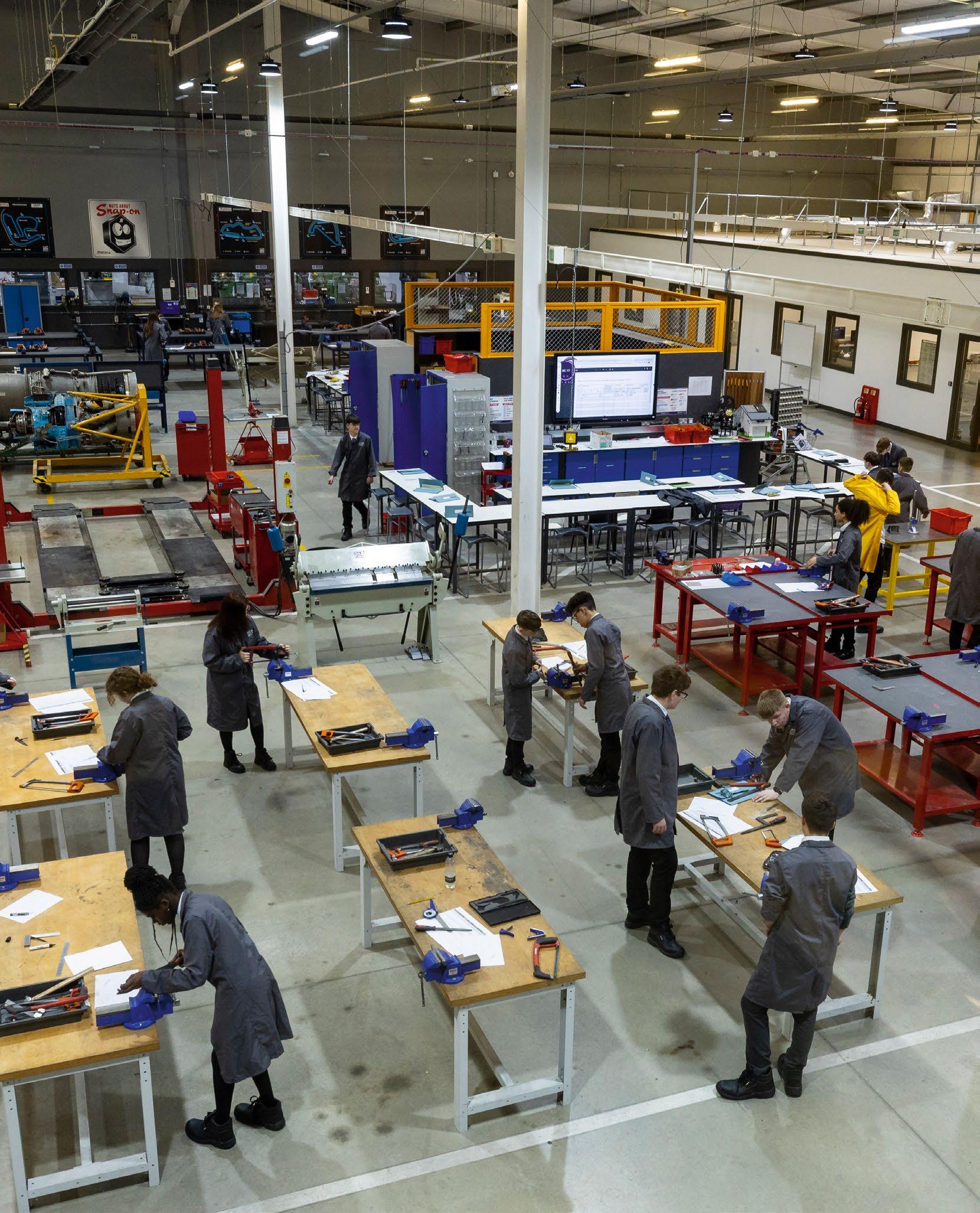

Year 10 Prospectus
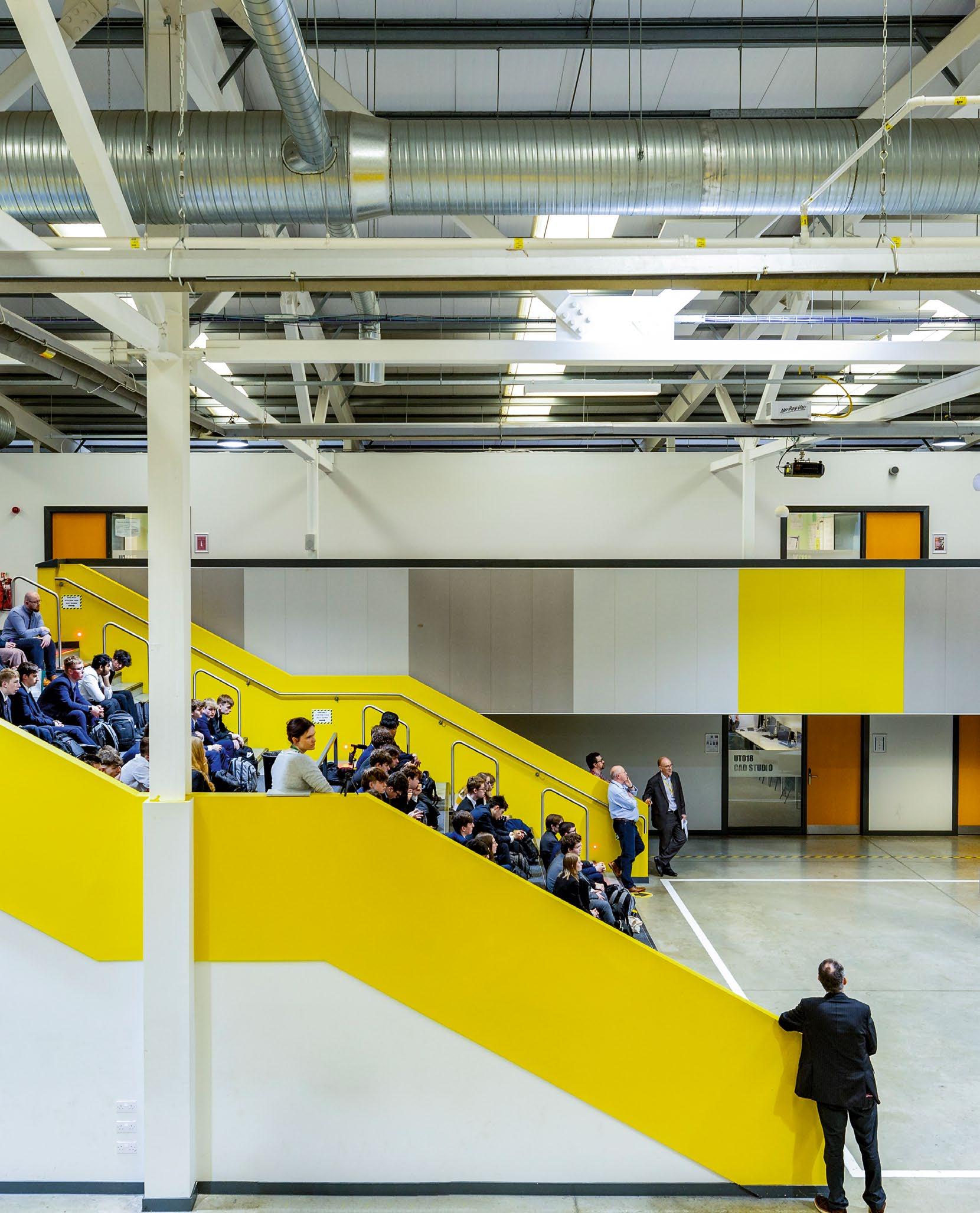
Year 10 Open Evening
02/10/2025
Options Evening
26/02/2026
Our Vision
To develop tomorrow’s Science, Technology, Engineering and Health professionals
Find Your Future
Welcome to University Technical College, Norfolk
Welcome to University Technical College Norfolk (UTCN), where innovation meets education in a dynamic and specialised learning environment. Easily accessible from Norwich city centre, our institution is dedicated to fostering the next generation of skilled professionals, equipped with the knowledge, practical skills, and entrepreneurial mindset essential for success in today’s rapidly evolving industries.
Our Ofsted inspection in January 2025 highlighted a number of outstanding areas of the school, with the Ofsted report included the following comments:
• ‘University Technical College Norfolk (UTCN) prepares its pupils exceptionally well for employment in the fields of science, technology, engineering and mathematics (STEM)’
• ‘Pupils participate in an extensive range of encounters with employers.’
• ‘The school has very high expectations of how well all pupils can achieve. As a result, pupils often achieve highly.’
• ‘Pupils become increasingly confident and resilient learners’
• ‘Many students progress into high level and degree apprenticeships and gain employment in leading engineering companies.’
• ‘Pupils are highly self-motivated. They are determined to be the best they can be.’
• ‘Lessons are a haven of calm.’
UTCN have achieved some of its best GCSE results ever:
• Basics (English & Maths) 9-4 75%
• Basics (English & Maths) 9-5 53%
• Engineering 9-4 equivalent 66%
Our students have also performed well in achieving grades 9-7 with some excellent results in the following subjects:
• Biology – 33%
• Chemistry – 33%
• English – 18%
• Maths – 24%
• Physics – 35%
• Computer Science – 16%
At UTCN, we blend academic excellence with real-world application, offering students a unique opportunity to explore STEM (Science, Technology, Engineering, and Mathematics) subjects alongside technical training, all within a supportive and collaborative community.
At UTCN we offer a unique curriculum which is underpinned by these three main areas:
Examinations
• Excellent teaching and learning leading to exceptional outcomes.
• A curriculum that focuses on science, technology, engineering and mathematics along with a range of other subjects.
• Online Dynamic Progress Reporting (DPR) for students to understand their priorities and steer their own learning to make excellent progress.
Employability
• Daily preparation for the world of work in every interaction, building habits today’s employers are looking for.
• Excellent pastoral support to live our core values of excellence, professionalism, respect and care.
Experience
• A pathway for students to ‘ Find their Future’ from the very beginning of their time with us.
• Real life industry experience with regional and national employers including employer encounters, industry visits and work experience.
• Sponsorship from a range of employers and University of East Anglia.
I look forward to meeting you at one of our open days or school tours.
Kind regards,
Luke
Moralee
, Headteacher
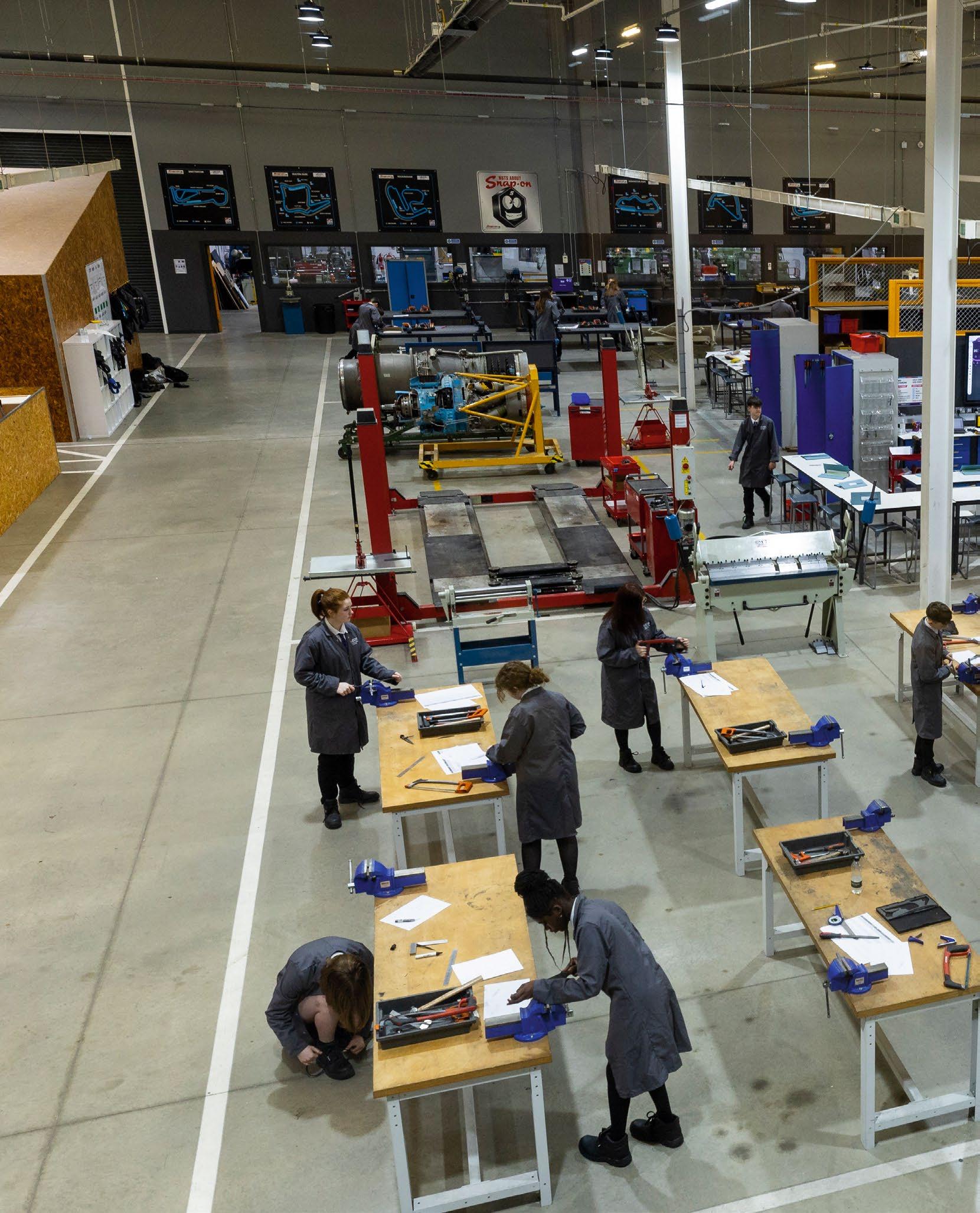
10 Things to Know About UTCN
1. STEM Focus
UTCN is dedicated to the disciplines of science, technology, engineering, and mathematics (STEM), offering a curriculum that emphasises these critical areas.
2. High Standards
At UTCN, we uphold high standards of behaviour and academic performance, fostering a disciplined and respectful learning environment.
3. Addressing Local Skills Gaps
We collaborate closely with local employers to address skills gaps in the community, ensuring our students are equipped with relevant and in-demand skills.
4. Diverse Qualifications
Our educational offerings include GCSEs as well as a range of vocational qualifications, providing students with diverse pathways to success.
5. Passion for Subjects
Our enthusiasm for STEM subjects is contagious, and we strive to instil a similar passion in our students, making learning both enjoyable and engaging.
6. Four-Year Programme
UTCN offers a comprehensive 4-year education programme, allowing students to continue their studies into the sixth form and gain deeper knowledge and experience.
7. Enrichment Opportunities
We provide numerous extra-curricular activities and enrichment opportunities, enabling students to develop new skills and interests outside the classroom.
8. Unique School Days
Our schedule includes longer teaching days from Tuesday to Thursday, with an earlier finish on Mondays and Fridays, optimising learning time while offering flexibility.
9. Employability Skills
UTCN places a strong emphasis on preparing students for their future careers by developing key employability skills such as teamwork, leadership, and problem-solving.
10. Close Employer Partnerships
Our strong relationships with local employers not only help bridge the skills gap but also offer students real-world insights and opportunities for future employment.
Cutting Edge Facilities
University Technical College Norfolk is equipped to the highest standards and contains specialist equipment, including £1.5m of recent investment for the Engineering and Science Facilities. Our equipment was procured after careful liaison with local employers to ensure that students are ‘work-ready’ when they leave us. With these facilities, excellent teaching and expert industry partnerships, we strive to empower our students to excel, innovate, and make a meaningful impact in their chosen fields.
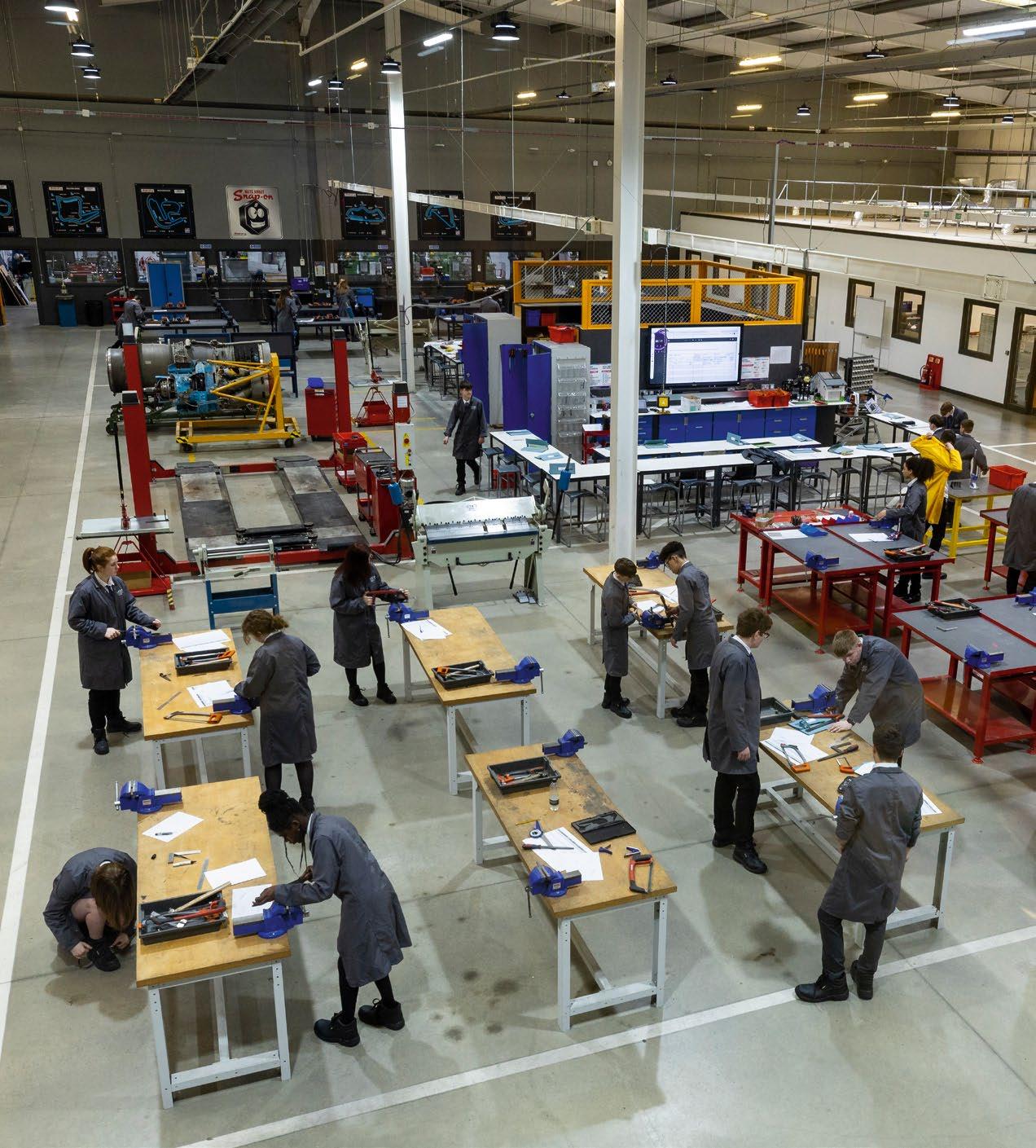
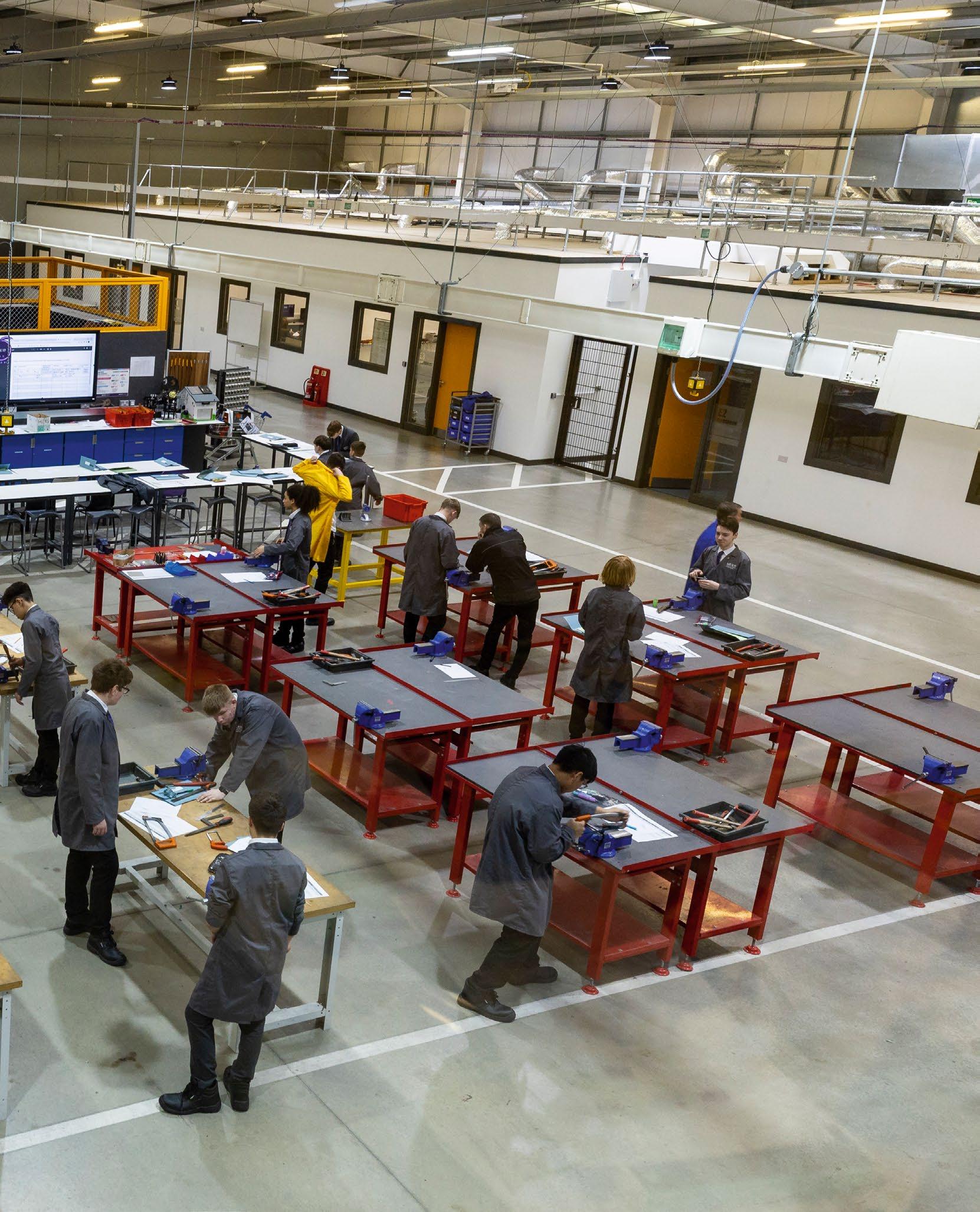
Employer supporters



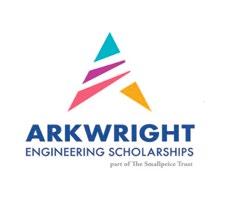



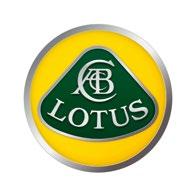


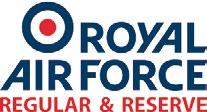
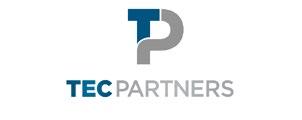






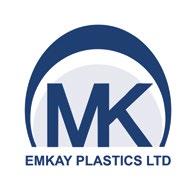



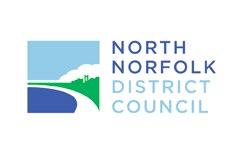



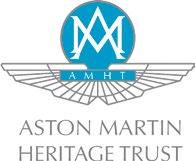






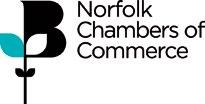




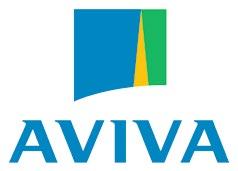


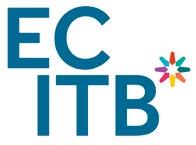







Where do our students go when they leave UTCN?
A large proportion of our students choose to either enrol on our T Level or A Level plus pathway or secure an apprenticeship with one of our employer partners – many of which are very well paid and offer excellent career progression.
Apprenticeships:
Anglian Water
Aviva
Balfour Beatty
BBC
BMW
British Army
British Sugar
Canham Consulting
Clearwater
Dyson
EDF
Electronics Tech
Farrans Construction
Glazing Vision
Harford Attachments Ltd
Jaguar Land Rover
James Fisher Lowestoft
KLM
Lawrence & Scott
Lotus
Marsh
Mercedes-Benz AMG
Morgan Sindall
MSI Defence System Ltd.
National Grid
NHS
Norfolk Property Services (NPS)
Opito – Skills for Oil and Gas
R.G Carter Robinson’s
Audi
RAF
Royal Navy
Scottish Power
Seajacks
Tarmac
Warren Services
BAE
BF1 Systems
Hewlett Packard
Lotus
RAF
Renvale
Courses and Options
Option Subjects
The curriculum at UTCN is designed in conjunction with local and national employers and universities to ensure our students develop the right skills for the future.
It is divided into three parts:
• The core curriculum which is compulsory for everyone
• Options which they can choose from
• Extra-curricular activities are timetabled in September and further supplement the curriculum.
As a key part of our role to prepare students for the future, work experience is an essential element. Therefore, in addition to the core programme, all students will participate in a week of work experience in May 2026.
Core Curriculum Subjects
All students will study ALL of the following subjects:
GCSE English Language
GCSE English Literature
GCSE Mathematics
GCSE Combined Science
Double Award
Vocational Award In Engineering
Physical Education
Personal, Social, Health and Economic
Option Subjects
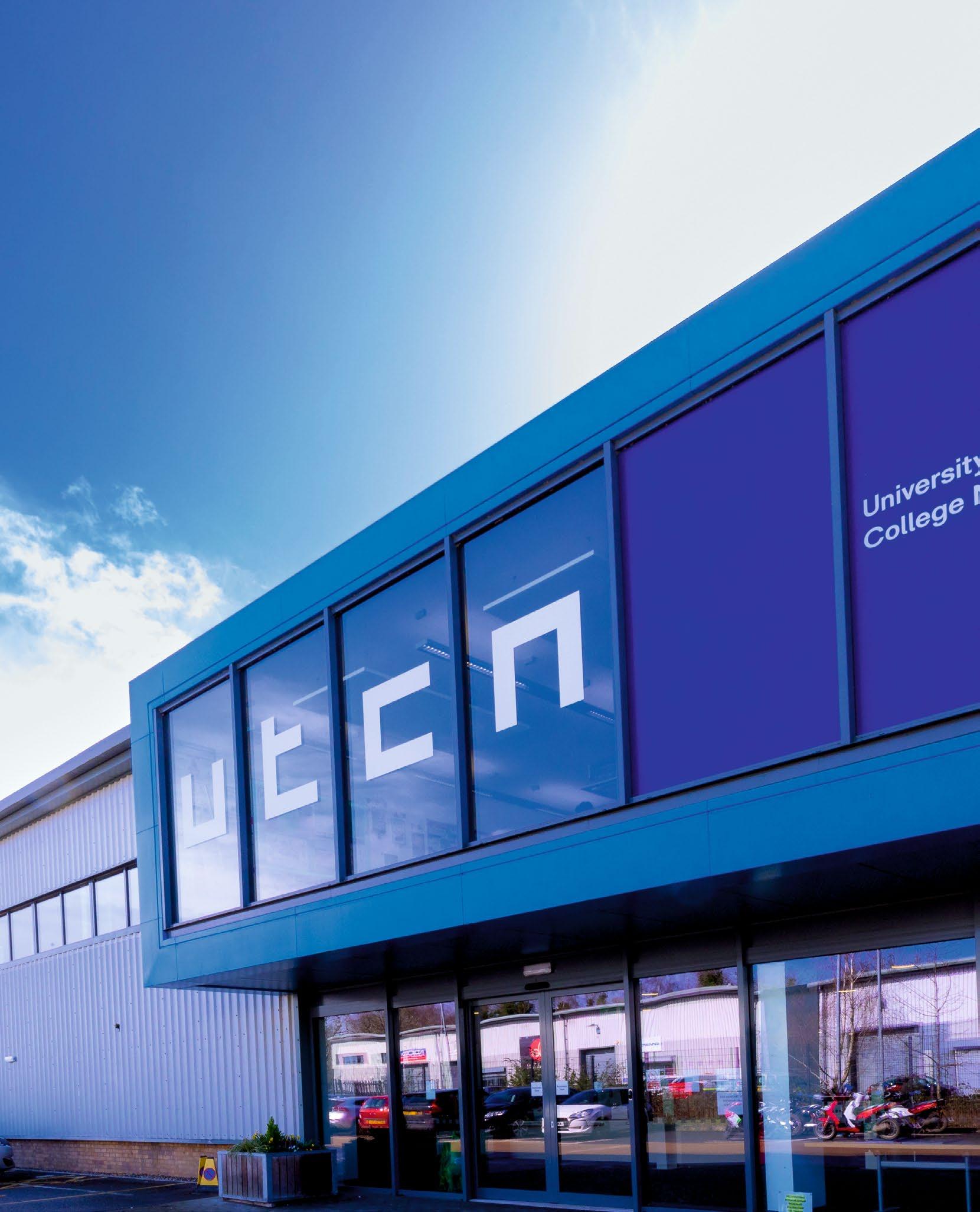
Students can choose three subjects from this list:
GCSE Triple Award Science
GCSE Business Studies
GCSE Computer Science
GCSE History
GCSE Art
GCSE Sociology
GCSE Geography
Pearson BTEC Health and Social Care
Technical Award in Health and Fitness
Level 2 Certificate in Further Maths
Extra Curricular Activities (Year 10 only)
Students will be given a choice of extra curricular subjects such as:
Duke of Edinburgh
F1 in Schools
Industrial Engineering
Applied Science
Applied Maths
Graphics/Textiles
Programming
Core Curriculum
Examining Body: AQA
GCSE English Language GCSE English Literature
What does the course cover?
In English Language, students will study both fiction and non-fiction from the 19th, 20th and 21st centuries, including creative writing elements for both. In English Literature, they will read a variety of texts including Shakespeare, a modern play, a nineteenth century novel and poetry.
Our set texts are:
• ‘Macbeth’ by William Shakespeare
• ‘The Strange Case of Dr Jekyll and Mr Hyde’ by Robert Louis Stevenson
• ‘An Inspector Calls’ by JB Priestley
• Power and Conflict Poetry
What skills will the course help students to develop?
Students will learn how to write fiction and non-fiction precisely, accurately and effectively and will develop their reading skills. The spoken language element of the course will help them to develop their formal presentation skills.
How is the course assessed?
There are two qualifications in English – English Language and English Literature. Each qualification is assessed through two external examinations at the end of the course.
What equipment do students need for the course?
There is no specialist equipment but students should acquire their own copies of the texts and a dictionary, if possible, to aid their learning. Students should regularly borrow books from the library or bring one from home.
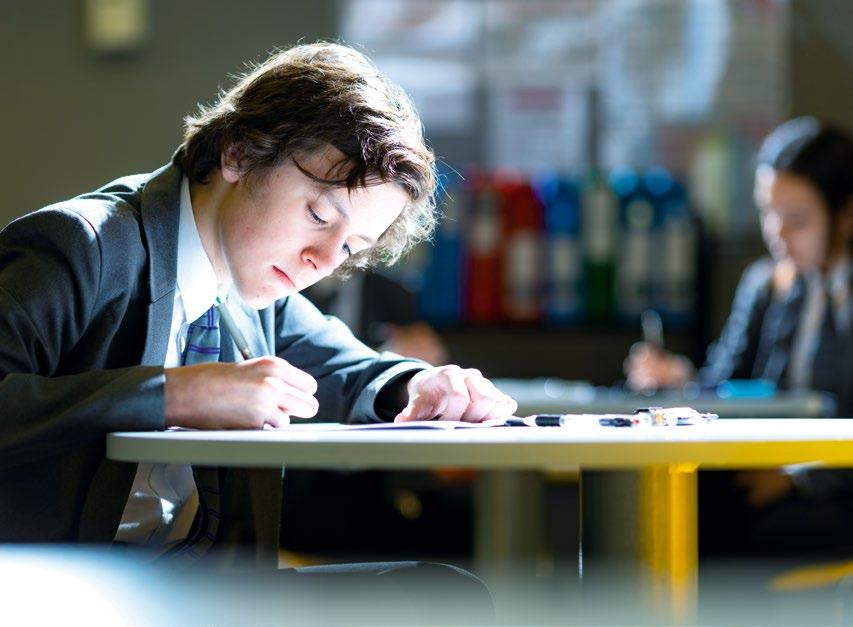
What other opportunities will be on offer for this subject?
There are regular events in English including theatre trips, author visits and reading clubs which are open to all students.
What do students who study this course go on to do?
As a core subject, skills gained in English help with all areas of study and work. Students who enjoy studying English can go on to study it further at A Level and it helps with all subjects that have a written component. A minimum grade 4 or 5 in English is the entry requirement for most level 3 pathways depending on the institution.
Core Curriculum
Examining Body: Edexcel
GCSE Mathematics
What does the course cover?
The curriculum covers
• Number
• Algebra
• Ratio, Proportion and Rates of Change
• Geometry and Measure
• Probability and Statistics
What skills will the course help students to develop?
The course develops all areas of numeracy and mathematics. It develops problem solving skills, quantitative reasoning and spatial awareness. It aids understanding of the Maths elements of other subjects including Science, Engineering and Computing.
How is the course assessed?
Students study the Pearson Edexcel GCSE (9-1) Mathematics course. This is assessed through three equally-weighted, written examination papers at either Foundation tier or Higher tier.
Paper 1 is a non-calculator paper while Papers 2 and 3 are calculator papers. Each of the three examination papers at both tiers are out of 80 marks with a duration of 1 hour 30 minutes.
Questions are targeted at grade 5–1 at Foundation tier and at grade 9–4 at Higher tier.
What equipment do students need for the course?
All students will need an approved scientific calculator, a full geometry set and a pencil. All other equipment will be provided.
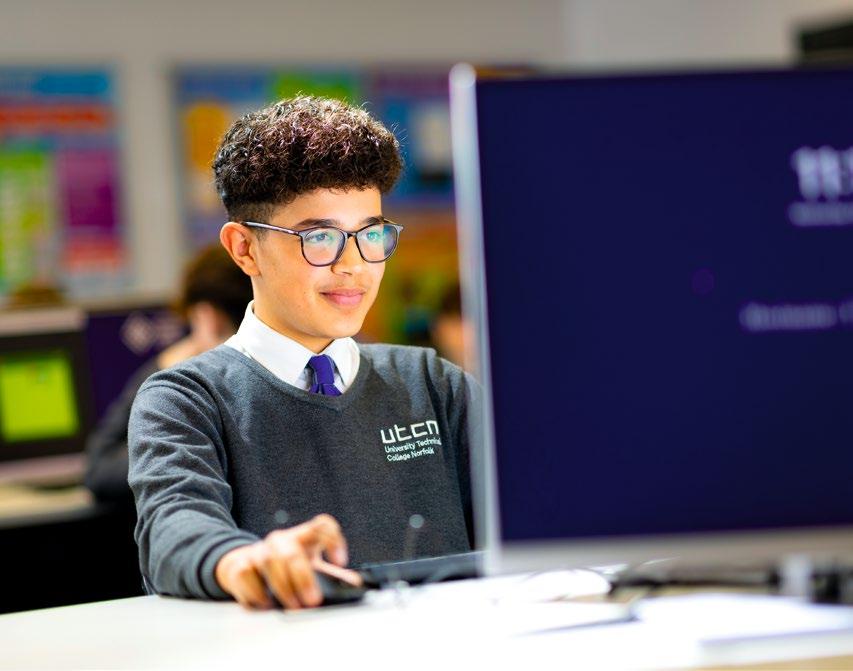
What other opportunities will be on offer for this subject?
There are regular Maths challenges and competitions against other schools locally and nationally. For example the school takes part in:
• Year 10 ‘all-you-can-eat’ feast of problems (Maths Feast), a fun educational challenge organised by AMSP (Advanced Mathematics Support Program).
• UK Maths Trust challenges such as Intermediate challenge (Year 10 and 11) and the Senior challenge (A-Level).
What do students who study this course go on to do?
Many students who do well in maths go on to study
A Level Maths, Further Maths or Statistics. It supports both A Levels and T Levels in the Sciences, Engineering and Computer Science. A grade 5 or grade 6 in Maths is the minimum expectation for most level 3 courses post-16.
Examining Body: AQA
GCSE Combined Science Double Award
What does the course cover?
The course covers Biology, Chemistry and Physics. Biology is the study of living organisms, their physiology, life-cycles and adaptations. Students will be introduced to topics including cardiovascular disease, human digestion, human evolution, inheritance, infectious disease, ecology and many more.
Chemistry is based upon the combinations and reactions of the 100 different elements that make up the world around us. Students will be introduced to topics such as bonding and matter, chemical changes, energy changes, quantitative chemistry and rate of chemical change.
Physics investigates how things work and how the universe can be explained using laws and theory from great minds such as Newton and Einstein. Students study topics including energy, electricity, particle model of matter, atomic structure, forces, waves, magnetism and electromagnetism.
What skills will the course help students to develop?
The course helps students develop scientific knowledge and skills. It helps them develop skills of hypothesis, inquiry, analysis and evaluation.
How is the course assessed?
Assessment will be comprised of six exams at the end of the course. Each exam is 1 hour and 15 minutes long.
What equipment do students need for the course?
No specific equipment is required but a revision guide will be available to purchase from the school and a folder will be handy to transport past papers. Core Curriculum
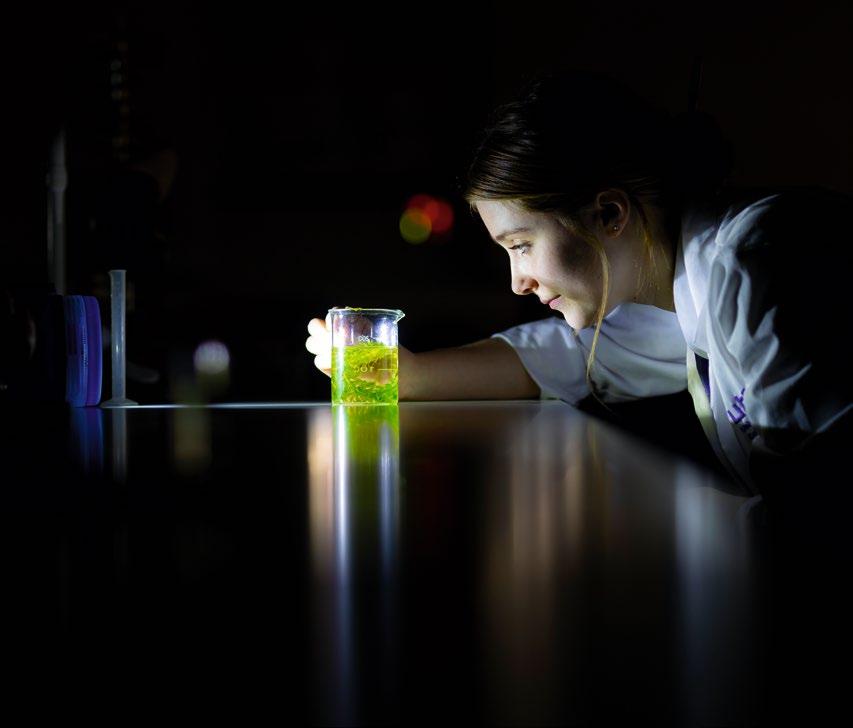
What other opportunities will be on offer for this subject?
The school welcomes a range of companies and employers who work in scientific fields who talk about their work and experiences. They also offer visits to their sites. They often also offer work placements to UTCN students as part of their work experience week or in their own time.
What
do students who study this course go on to do?
Students who want to study science further often sit A Levels in the Sciences or T Level Science or Health. Good scientific qualifications support studies in Engineering and other related fields.
Core Curriculum
Examining Body: WJEC
Vocational Award In Engineering
What does the course cover?
This qualification enables students in Year 10 to take their first steps into the world of Engineering.
This course introduces students to the essential skills required to be an engineer. It teaches them about a range of engineering processes and uses examples from current engineering careers to build knowledge about work. Students learn to use tools and equipment safely and appropriately in order to meet a tolerance of +/0.3mm during fabrication. Additional practical lesson time each week ensures students are well versed in the machine room and able to work the centre lathes and vertical milling machines both safely and independently.
Units of study include:
• Manufacturing Engineering Products
• Designing Engineering Products
• Solving Engineering Problems
What skills will the course help students to develop?
This course introduces students to the essential skills required to be an engineer. It teaches them about a range of engineering processes and uses examples from current engineering careers to build knowledge about work. Students learn to use tools safely and appropriately.
How is the course assessed?
Two units are assessed by controlled assessment totalling 60% of the qualification. Unit three is assessed by a written examination contributing to 40% of the total mark.
What equipment do students need for the course?
Students need specialist engineering workwear. Please see the uniform list for details.

What other opportunities will be on offer for this subject?
The school has a wide range of connections with local and national engineering companies. There are a multitude of engineering events throughout the year and students have the opportunity to work with engineers from all sectors.
What do students who study this course go on to do?
This course offers a firm foundation for further Engineering study and qualifications. It also offers an opportunity to learn about a range of entry level careers in engineering.
Physical Education (PE) Personal, Social, Health and Economic (PSHE)
What does the course cover?
Core PE is studied by all students as part of their curriculum. This ensures that all students develop their personal health and fitness. Our students have the opportunity to complete PE in a range of different local facilities such as the UEA Sports Park. This allows for a bespoke curriculum depending on the needs of the students. Typically, students spend one afternoon per week on PE.
The programme of study includes a wide range of physical activities including football, badminton, basketball, netball, table tennis and dance in the winter months, and athletics, rounders and cricket in the summer months.
What skills will the course help students to develop?
The course helps students keep a good level of fitness, understand rules of team and individual sports and have opportunities to coach and be coached. The aim of the course is to build healthy life-long fitness habits and team working skills.
How is the course assessed?
There is no formal assessment for this course but students will receive regular feedback.
What equipment do students need for the course?
Students will need all approved items of PE uniform as listed on the website.
What other opportunities will be on offer for this subject?
The school arranges fixtures in a number of sports with other schools throughout the year. There is an annual sports day which offers lots of opportunities for everyone to get involved, no matter what their ability.
What does the course cover?
All students participate in the UTCN PSHE programme. The programme consists of:
• Relationship and sex education
• Personal development and staying safe
• Social interactions
• Healthy lifestyles
• Careers education and employer engagement activities
• Learning about living in the modern world including politics, religion, finance and economics
• British values
• Exploring religious faith and beliefs
What skills will the course help students to develop?
This course develops students’ ability to understand their place in the world and how to interact with others. It looks at their communities, including their family, school and neighbourhood as well as what it means to live in the UK and be a global citizen in the 21st century.
Students are supported with their transition to UTCN in Year 10 and their understanding and application of high quality destinations in Years 11 and 13. They develop an understanding of risks and how to stay safe, and learn debating skills and how to evaluate news and other sources of information.
How is the course assessed?
There is no formal assessment for this course but students will receive regular feedback.
What equipment do students need for the course?
There is no specialist equipment for this course.
What other opportunities will be on offer for this subject?
The school often arranges visiting speakers to come and share their expertise in a range of areas. There is an annual educational visits day built around developing students’ cultural capital.
Option
Examining Body: AQA
GCSE Triple Award Science
What does the course cover?
Students will work towards three GCSEs in their science course, following the AQA Biology, Chemistry and Physics syllabi.
By choosing this option, students will study the three separate disciplines of science with dedicated lessons in each. This will replace Combined Science from the core subjects list. Taking three separate sciences allows students to delve deeper into the fascinating topics within each subject such as; the brain, the eye, space and chemical analysis of products.
What skills will the course help students to develop?
The course helps students develop scientific knowledge and skills such as hypothesis, inquiry, analysis and evaluation. They will learn the skills needed to interact with the biological, molecular and physical world including, but not limited to: measuring mass, speeds, concentrations, volumes, and temperatures.
How is the course assessed?
Assessment will consist of six exams at the end of the course (two per science). Each exam is 1 hour and 45 minutes.
What equipment do students need for the course?
No specific equipment is required but a revision guide will be available to purchase from the school and a folder will be helpful to transport past papers that have been completed at home.
What other opportunities will be on offer for this subject?
The school welcomes a range of companies and employers who work in scientific fields who talk about their work and experiences. They also offer visits to their sites and work placements to UTCN students as part of their work experience week or in their own time.
What do students who study this course go on to do?
Students who want to study science further often sit
A Levels in the Sciences or T Level Science. Good scientific qualifications support studies in Engineering and other related fields.
Option
Examining Body: Edexcel
GCSE Business
What does the course cover?
GCSE Business is split into two themes:
Theme 1: Investigating Small Businesses - This part of the course concentrates on key business concepts, issues and skills involved in starting and running a small business. It provides a framework for students to explore core concepts through the lens of an entrepreneur setting up a business.
Theme 2: Building A Business - In this section we examine how a business develops beyond the startupphase. It focuses on the key business concepts, issues and decisions used to grow a business.
Lessons will be business led. Each topic will include real business examples from small start-up businesses to multinational companies. Students will learn a wide range of business knowledge, from starting their own business to developing marketing strategies and understanding financial accounts.
What skills will the course help students to develop?
Students will have the opportunity to develop a range of skills to include analysing and evaluating business strategic decisions.
How is the course assessed?
The course has two externally assessed examinations. Each exam is 1 hour and 45 minutes in duration.
What equipment do students need for the course?
Core equipment which includes a black pen, green pen, pencil, rubber, pencil sharpener, ruler, protractor, highlighter, scientific calculator.
What do students who study this course go on to do?
Whilst the skills students develop when studying Business are relevant for almost all career paths, many students continue to study Business at A level or use this knowledge to study Engineering further.
Examining Body: OCR
GCSE
Computer Science
What does the course cover?
This subject gives students a real, in-depth understanding of the functionality of computer technology and provides a general grounding in computing, the principles of programming and problem-solving. Computer Science is a practical subject where students can apply the academic principles learned in the classroom to real world systems. What skills will the course help students to develop?
Our Computer Science qualification will develop students’ computational thinking, helping them to develop the skills to solve problems, design systems and understand the power and limits of human and machine intelligence.
How is the course assessed?
The course has two externally assessed examinations. Each exam is 1 hour and 30 minutes in duration. Students also have the opportunity to undertake a programming task(s).
Component 01: Computer Systems - Students are introduced to the central processing unit (CPU), computer memory and storage, data representation, wired and wireless networks, network topologies, system security and system software. It also looks at ethical, legal, cultural and environmental concerns associated with computer science.
Component 02: Computational thinking, algorithms and programming - Students develop skills and understanding in computational thinking: algorithms, programming techniques, producing robust programs, computational logic and translators.
Component 03: Practical Programming - Students are given the opportunity to undertake a programming task(s) during their course of study which allows them to develop their skills to design, write, test and refine programs using a high-level programming language. Students will be assessed on these skills during the written examinations, in particular component 02 (section B).
What do students who study this course go on to do?
This course will be invaluable preparation for students who want to go on to study Computer Science at a higher level and will also provide a good grounding for other subject areas that require computational thinking and analytical skills.
Option
Examining Body: Edexcel
GCSE History
What does the course cover?
History Edexcel GCSE equips students to become critical thinkers about the past. Through in-depth study of key periods and events, students develop a strong understanding of historical change and continuity, focusing on Crime and Punishment in Britain, Henry Viii and his Ministers, Weimar and Nazi Germany and The Cold War. They explore diverse historical interpretations and analyse primary sources to build their own informed judgements. The course homes essential skills like analysis, evaluation, and communication. Students learn to compare and contrast historical viewpoints, construct well-reasoned arguments supported by evidence, and draw insightful conclusions about the past’s impact on the present.
What skills will the course help students to develop?
Students will develop many transferable skills to include presenting, problem solving, analysis and evaluation.
How is the course assessed?
The course has three externally assessed papers varying in duration from 1 hour and 20 minutes to 1 hour and 50 minutes.
What equipment do students need for the course?
Core equipment which includes a black pen, green pen, pencil, rubber, pencil sharpener, ruler, protractor, highlighter, scientific calculator.
What other opportunities will be on offer for this subject?
Biennially, we run a residential trip to Berlin. Historically, Berlin is a city which is the epicenter of great historical and cultural change: two of our units (Weimar and Nazi Germany, and Superpower Relations) feature the capital. Throughout the course of a week in Germany, students will discover tangible history and how Berlin has been shaped across the course of the twentieth century.
What do students who study this course go on to do?
Students who wish to study History further often choose to study it at A Level alongside two other subjects. Careers in this field include teaching, researching, journalism, law, heritage management and archaeology.
Examining Body: Edexcel
GCSE Art and Design
What does the course cover?
GCSE Art and Design provides the opportunity for students to explore both contemporary and historical sources of art, craft and design first hand.
What skills will the course help students to develop?
The delivery of Art has been carefully planned to include a wide range of skills and techniques including drawing, painting, collage, mixed-media, photography, printmaking, model-making, and contextual studies. Drawing from observation is an important element of the course and will help to develop students’ spatial awareness, visual perception and judgement.
How is the course assessed?
The course is assessed through two internally assessed and externally moderated components.
What equipment do students need for the course?
Students will need to create an Art portfolio and will need specific art folders for the course. All other art equipment will be provided, where possible. Further information will be provided at the beginning of the course.
What other opportunities will be on offer for this subject?
At the end of this course, students’ work is exhibited at UTCN, and parents are invited to attend the exhibition with their child.
What do students who study this course go on to do?
Many of our students use Art to support their interest in engineering design. Students often move onto study Engineering or Art at Post 16.
Examining Body: WJEC
GCSE
Sociology
What does the course cover?
Sociology is the study of human relationships and institutions. It gives students eye-opening insights into human behaviour and the way we have changed our views over time. It helps students to gain knowledge and understanding of key social structures, processes and issues through the study of families, education, crime and deviance and social groups. Students will develop their analytical, assimilation and communication skills by comparing and contrasting perspectives on a variety of social issues, constructing reasoned arguments, making substantiated judgements and drawing reasoned conclusions.
What skills will the course help students to develop?
By studying Sociology, students will develop transferable skills including how to investigate facts and make deductions; develop opinions and new ideas on social issues and analyse and better understand the social world. They will practise using different research methods and debate key societal issues.
How is the course assessed?
The course has two externally assessed examinations. Each exam is 1 hour and 45-minutes in duration.
What equipment do students need for the course?
Core equipment which includes a black pen, green pen, pencil, rubber, pencil sharpener, ruler, protractor, highlighter, scientific calculator.
What other opportunities will be on offer for this subject?
There is a planned trip to the London museum to delve deeper into the Crime and Deviance unit of the Sociology course. We also have visits from Norfolk Police who deliver specialist talks on the changes in crime and the factors influencing that change.
What do students who study this course go on to do?
The skills students develop when studying Sociology are relevant and useful for almost all future study and career paths due the content and analytical nature of the course. There are some specific career paths that are more closely linked to it, for example, teaching, marketing, law, policing and management roles.
Option
Examining Body: AQA
GCSE Geography
What does the course cover?
Students will travel the world from their classroom, exploring case studies in the United Kingdom (UK), higher income countries (HICs), newly emerging economies (NEEs) and lower income countries (LICs). Topics of study include climate change, poverty, deprivation, global shifts in economic power, and the challenge of sustainable resource use. Students are also encouraged to understand their role in society, by considering different viewpoints, values, and attitudes.
What skills will the course help students to develop?
Students will gain global awareness throughout their study through learning about diverse cultures, societies, economies, and environments across the globe. This fosters a broader understanding of interconnectedness and global issues like climate change, poverty, and resource management. Furthermore, it helps students develop a deeper understanding of their local environment, the UK, and other parts of the world, fostering a sense of place and belonging.
How is the course assessed?
The course is assessed over three papers: Paper 1 focusing on Physical Geography, Paper 2 on Human Geography and Paper 3 on Geographical Applications. Each paper is 1 hour and 30 minutes in duration.
What equipment do students need for the course?
Core equipment which includes a black pen, green pen, pencil, rubber, pencil sharpener, ruler, protractor, highlighter, scientific calculator.
What do students who study this course go on to do?
Students studying geography will undertake physical and human Geography fieldwork, focusing on accurate and appropriate data collection and analysis. We run a day trip to Southwold to explore the changing coastline as well as the evolving population.
Option
Examining Body: Pearson BTEC
BTEC Health and Social Care
What does the course cover?
The skills and knowledge students will develop on this course include understanding of how individuals develop throughout their lives, how events can affect people, strategies to help with these events, health (good and bad) and the care services that are provided in the UK.
As the coursework for this subject is worth 60% of the final grade, students will also develop and understand how to write essays that are concise, informative and well structured to enable them to achieve the highest marks possible.
How is the course assessed?
The course has three units for assessment:
• Component 1: Human Lifespan Development (coursework, completed in Y10 worth 30% of the final grade)
• Component 2: Health and Social Care Services and Values (coursework, completed in Y11 worth 30% of the final grade)
• Component 3: Health and wellbeing (exam, completed at the end of Y11 worth 40% of the final grade)
What equipment do students need for the course?
Core equipment which includes a black pen, green pen, pencil, rubber, pencil sharpener, ruler, protractor, highlighter, scientific calculator.
What other opportunities will be on offer for this subject?
The Science faculty regularly invite speakers from the Health sector to talk to students about potential careers in this field.
What do students who study this course go on to do?
Students who want to study science further often sit A Levels in the Sciences or a T Level. Good scientific qualifications support studies in Engineering, Health and other related fields.
Examining Body: NCFE
Technical Award in Health and Fitness
What does the course cover?
The study of Health and Fitness involves understanding the functions of the body systems, understanding of the principles of training, knowing how the body reacts in the short-and long-term to fitness activities, how to create and apply lifestyle analysis tools and how to create a fitness programme for a person with specific goals.
What skills will the course help students to develop?
This qualification is for students who are looking to develop a significant core of knowledge and understanding of Health and Fitness. It encourages them to use knowledge and practical tools to focus on supporting people with specific health and fitnessrelated goals.
How is the course assessed?
The course is assessed over two units. Unit 1 is an external written exam which is worth 40% of the final grade, and Unit 2 is a synoptic project which is 60% of the final grade. The content of this course will be delivered in both practical and theory lessons.
What equipment do students need for the course?
Whilst this subject is primarily classroom-based, students will need their PE kit for the practical elements of the course.
What do students who study this course go on to do?
Students may progress onto sport-related courses, including personal training, nutrition and sports sciences. Health and Fitness also has strong links with the sciences, and compliments further study of subjects such as Biology.
Option
Examining Body: AQA
GCSE Level 2
Further Maths
This is an untiered Level 2 linear qualification. This course is an additional qualification to the GCSE Mathematics, rather than a replacement.
What does the course cover?
It gives an introduction to calculus and matrices and develops further skills in trigonometry, functions and graphs.
Subject content is set out in the following six distinct topic areas:
• Number
• Algebra
• Coordinate Geometry (2 dimensions only)
• Calculus
• Matrix Transformations
• Geometry
What skills will the course help students to develop?
This course develops higher order technical proficiency, rigorous argument and problem solving skills.
How is the course assessed?
Students take two examination papers. Both question papers must be taken in the same series.
• Paper 1: 1 hour 45 minutes / 80 marks / Non-calculator
• Paper 2: 1 hour 45 minutes / 80 marks/ Calculator
What equipment do students need for the course?
Students need a suitable scientific calculator.
What do students who study this course go on to do?
The course is suitable for students aiming for grades 7, 8 and 9 who wish to progress to A-Level Maths and possibly A-Level Further Maths.
Arkwright Engineering Scholarships Programme
The Arkwright Engineering Scholarships programme identifies, inspires and nurtures future leaders in Engineering, Computing and Technical Design.
There is a rigorous selection process for Arkwright Engineering Scholarships for high calibre students who apply in Year 11 and meet the scholarship criteria. The Arkwright Engineering Scholarships support students through A Levels and encourage students to pursue Engineering, Computing or Technical Design at University or through a higher-level apprenticeship and to pursue careers in the field.
Every Arkwright Engineering Scholarship is sponsored by an industrial company, university, charitable trust, trade association, professional institution, armed service, worshipful company, industry regulator or personal donor.
We are very proud to have current student scholars, sponsored/ mentored by prestigious UK companies. If you have the potential, we will do all we can to support you through the rigorous selection process.
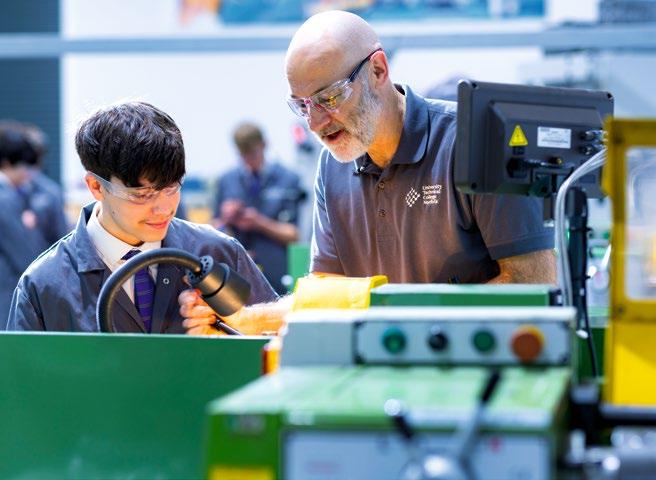
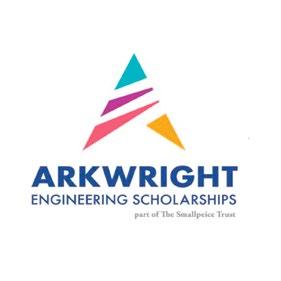
“ Through work experience from my sponsor, a whole new career path has been opened for me and has set me up for when I leave to go straight into a degree apprenticeship. It is worth applying because it really pushes you and opens up a lot of doors to help you progress in the future.”
Lucie, UTCN Alumni

Curriculum Enrichment
Duke of Edinburgh Award
UTCN offers students in Year 10 the opportunity to undertake the Silver Award which consists of the following sections:
• Volunteering – to undertake service to individuals and to the community.
• Expedition – undertaking a spirit of adventure and discovery on an overnight expedition.
• Skills – to develop personal interests, hobbies or social and practical skills.
• Physical Recreation – to participate and improve in a physical activity.
Expeditions are organised by UTCN each year and students attend regular training sessions at school in order to complete the Expedition Section. The remaining sections are completed by students in their own time. UTCN staff support students as they progress through the award, however a large amount of responsibility lies with the student. It is not necessary to have participated in the Duke of Edinburgh Award Scheme previously as students can begin the Silver Award level as a direct entrant. The Silver Award can be completed in as little as 12 months.
After completion of the Silver Award level, students are able to progress to the Gold Award level and will continue to receive support from UTCN with its completion.
Further Opportunities at UTCN
• Careers Expo
• Ski Trip
• Offshore Wind activities
• Fatal 4 – Road Safety Awareness
• First Aid Training
• Financial workshops
• Maths Challenges
• Student Librarians
• Theatre trips
• Trips to Engineering firms
• RAF Principles of Flight day
• UEA Maths workshops
• Youth STEMM Award
Visit us
If you like the look of this prospectus, then come and see us!
You can do this by booking a tour with Admissions or attending our Open Evening on the 02/10/2025
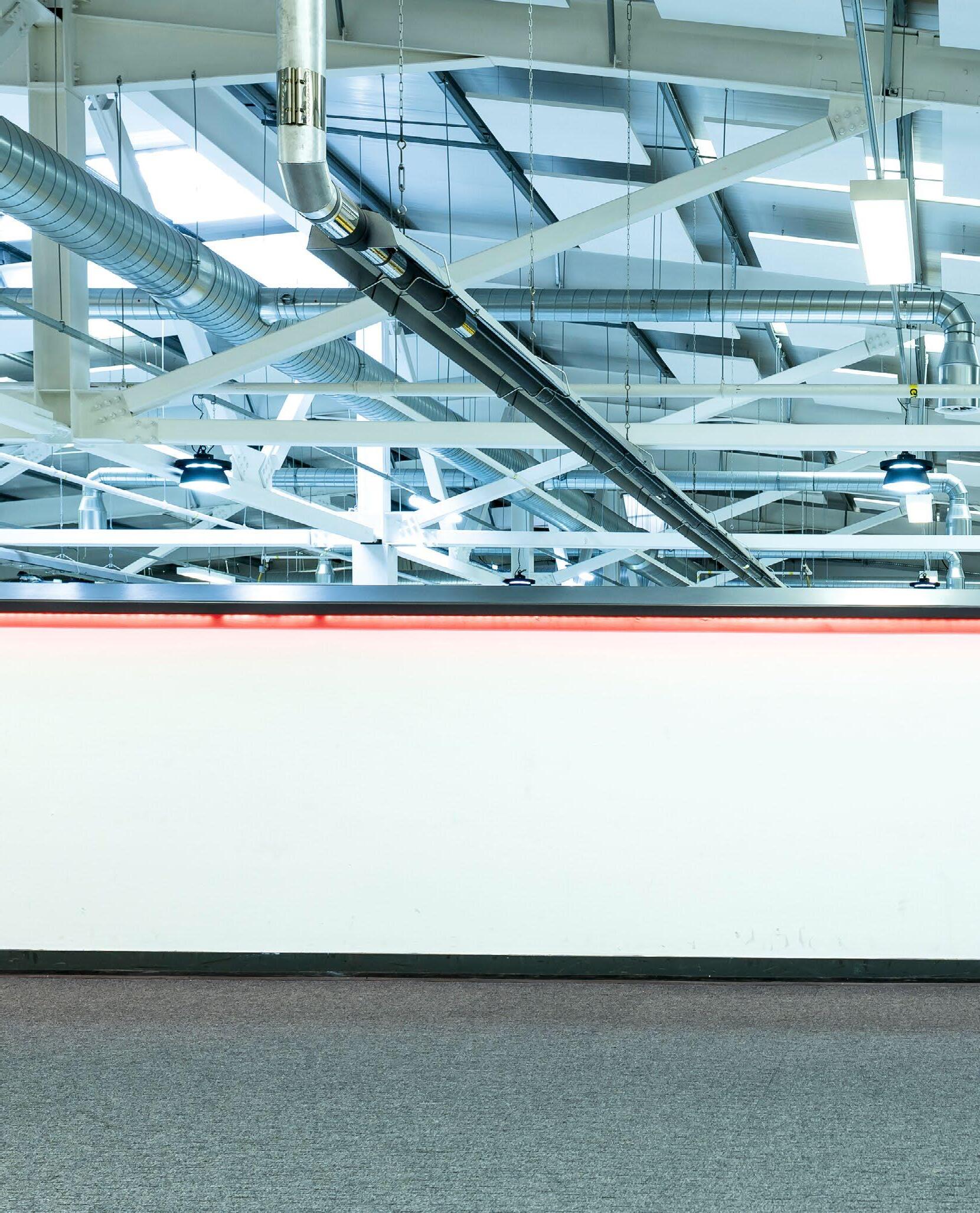
You can apply online at www.utcn.org.uk. You will need to provide some basic information and explain briefly why you want to join us. Apply by 31/10/2025
Acceptance
If you would like to accept our offer, let us know by 12/01/2026
Administration Evening
You will be invited to attend an administration evening in February 2026 to ensure we have all documentation in preparation for enrolment.
CAT testing
You will be invited to attend a morning or afternoon testing session at UTCN. This is to ensure we put you in the right classes in September. It also helps us to ensure a balanced mix of students. Testing is in November 2025

Offer
Subject to there being enough places available you will receive an offer via email. Offers will be received by 12/12/2025
4
Induction
Options Evening
We will host an options evening on 26/02/2026 for Year 10 applicants to find out more about the option subjects available to them. Following this evening, applicants will be required to select their chosen subjects.
7
We have an induction day in July for all students who have applied for Year 10 starting in September 2026. This is a great chance to experience UTCN and meet your classmates for next year Start!
You start with us in September 2026! Over
Please note we expect to be oversubscribed for the 2026 entry. Should we reach full capacity, you will be placed on a waiting list. If a place becomes available, you will be informed and made an offer.
8 9
Travelling to UTCN by bus
UTCN is located approximately 2.5 miles from Norwich City Centre and is easily accessible from all parts of Norfolk and Suffolk. Please refer to our website for more information about travel options.
Travel by Train
For students who wish to travel by train, the school is a short bus journey from Norwich Train Station and there is a contract bus which can shuttle students from the train station to the school. If a student travels into Norwich by train it is advised that they purchase a contract bus pass via the school to ensure they arrive at the school on time.
Travel by Bus
There are two types of buses that service the school.
1. UTCN Contract Bus
2. FIrst Bus Service Public Bus
Route Travelling from Norwich City Centre or travelling by train to Norwich
Contract Bus
The contract bus leaves in the morning from Norwich Train Station and various other stops in Norwich City Centre starting from 8:25am. It returns to Norwich City Centre at the end of the school day, ending at Norwich Train station. Please look at our website for more details. Please check our website for the latest bus price information.
First Bus Service Public Bus
The following bus routes service the school: 7, 36, 37, 38. Please look at our website for more details.
The most economical way of travelling by bus is buying a bus pass. We have summarised the options below:
Travelling by bus from home on a First Bus route
Purchase Options Purchase from the school
Purchase from First Bus and also valid on school contract bus
Travelling by bus from home on a route offered by another bus provider (ie Konnect, Stagecoach)
Purchase from the school
Travel by bicycle
There are covered bicycle racks available at the school. Students leave their bicycles at their own risk and are advised to follow all safety precautions including wearing a helmet and using cycle lanes where appropriate.
Travelling to UTCN by moped or motorbike
For students who wish to travel to UTCN by moped or motorbike there is specific parking available at school. Vehicles are left at the students’ own risk and students should follow all safety precautions including wearing a helmet.
Year 10 Uniform
Our Uniform Supplier is Birds of Dereham. The UTCN uniform is designed to be smart, professional and cost effective.
Further clarification on our uniform can be found in the uniform policy on our website.
UTCN insists on high standards of personal presentation. Our Uniform and Appearance policy has been developed with our governing body of employers to prepare students for the world of work. All prospective students and their parents should ensure that they are able to adhere to the UTCN Uniform and Appearance Policy as it is strictly enforced. Items marked Birds can only be purchased from our uniform supplier Birds of Dereham.
All items are required unless otherwise stated.
Uniform: Year 10 and 11
Classroom
• Trousers: Plain black, tailored, regular fit (no denim, pocket zips or embellishments, no tight trousers, leggings, jeans or ¾ length trousers).
• Skirt: Branded black skirt only. This should be worn at the standard length. (Birds of Dereham).
• Socks: Plain black, no logos.
• Tights: Plain black.
• Shirt: Plain white shirt with collar. The shirt must be tucked in and with the top button fastened.
• Jumper (optional): Graphite V-neck jumper with UTCN logo. (Birds of Dereham)
• Blazer: Graphite blazer with UTCN logo on jacket pocket. (Birds of Dereham)
• Shoes: Plain black leather school shoes, providing adequate protection and support (no casuals, fabric, canvas, trainers, sandals, sling backs, pumps, high heels, boots, coloured laces, coloured stitching, logos).
• Tie: UTCN tie for appropriate year group. Worn to the waist. (Birds of Dereham) Spare ties are available from UTCN.
• Belts: Plain black, plain buckle (no oversized buckles).
• Hijab, abaya, prayer cap, turban, patka: Plain matt black.
• T-shirts and Vests: Only plain, white T-shirts or vests may be worn under school shirt
Workshop
• Black Chukka safety boots: Must include steel toe protection and mid-sole penetration protection. (V&J or must be marked S1P or SBP compliant) available from Birds of Dereham
• Black dustcoat: with UTCN logo. (Birds of Dereham)
P.E
Logos/slogans/accessories/decorations are not permitted on any item of PE clothing, apart from the UTCN logo.
Required items:
• Polo shirt: Purple with UTCN logo (Birds of Dereham).
• Shorts: Black, loose fitting, suitable length e.g. football/ hockey style shorts.
• Socks: Plain white sports socks (for all lessons other than football). Purple Football socks (Birds of Dereham).
• Shin pads
• Trainers: Suitable for taking part in indoor and outdoor sport (no pump or canvas-style shoes).
Optional items:
• Zip mid layer: Black UTCN (Birds of Dereham).
• Sports trousers / Leggings: Plain black or black leggings with UTCN logo.
• Football boots: Are required for fixtures.
Outside
• Coat: Suitable smart coat.
• Scarves: Only in cold weather.
• Hats: Plain black woollen hat, only in cold weather (no bobbles, visors)
Appearance
• A single necklace or bracelet for religious reasons.
• Hair fasteners: Plain black, navy or plain white. No beads or other jeweled items to be worn in the hair.
• Earrings: Small plain studs in the lower earlobe (under 5mm in diameter), matching pair or single.
• Make-up: To be modest and discreet (no lipstick or false eyelashes).
• No nail varnish or acrylic nails.
• No body jewellery, tattoos, visible undergarments.
• Badges: Are not to be worn (except official UTCN badges e.g. merit badges).
• Hair: Natural hair colours only. No hair dyes and coloured hair extensions. Hair must not be cut shorter than Grade 2 and must not have patterns or shapes cut into it.
• Facial Hair: Students are allowed facial hair as long as it is in keeping with the fundamental principle of smart business appearance.
Any hairstyle or dress which, in the view of the Head teacher is deemed unacceptable, will not be allowed.
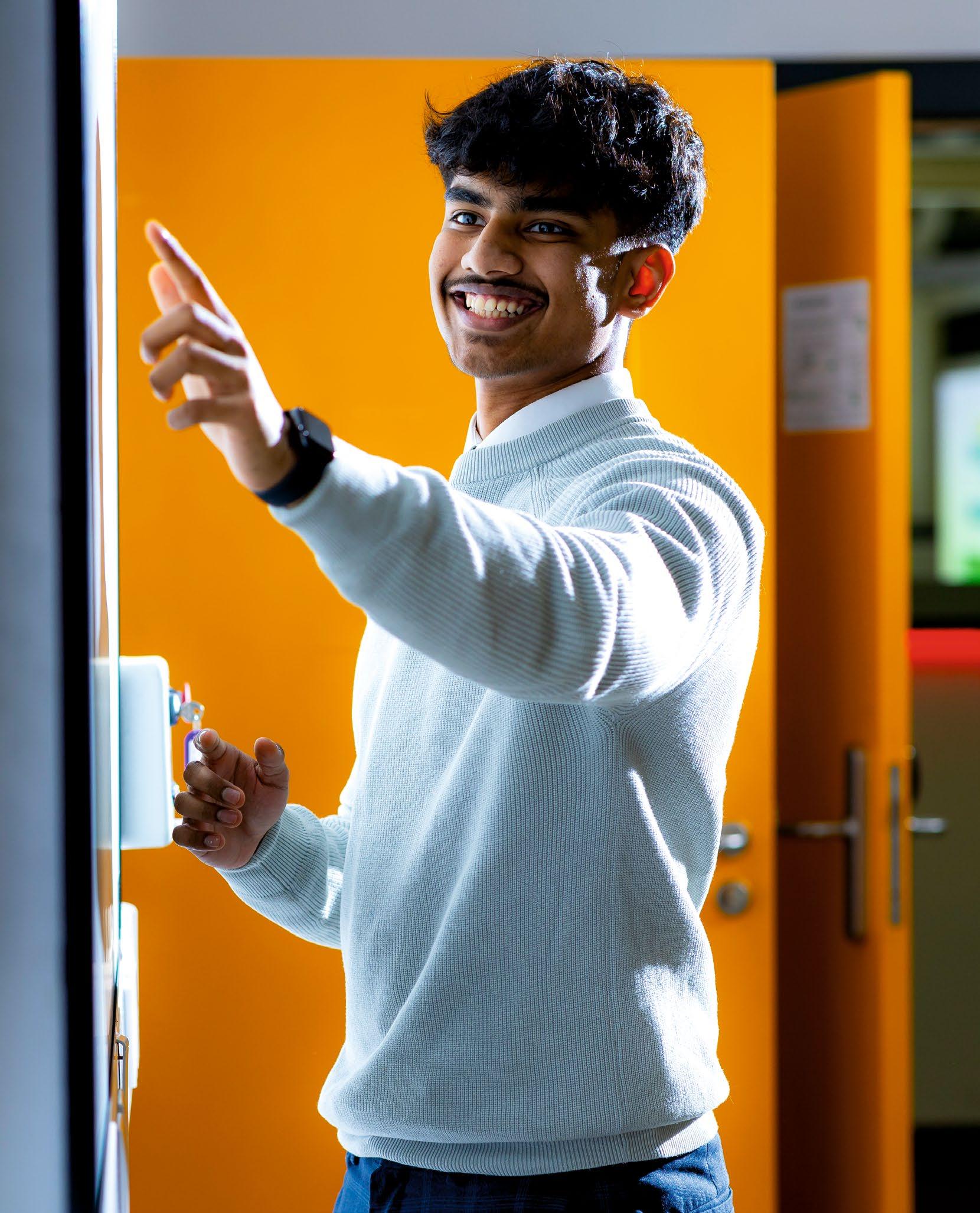
10 Things to AboutKnowUTCN
3 Skills
There is a local skills gap which we work closely with employers to address
4 Years
We offer a 4-year education programme so you can stay on at our Sixth Form
6
4 Exams
We teach GCSEs as well as other vocational qualifications
7Extra curricular
We have lots of opportunitiesenrichment for you to get involved in
10 Facilities
We have state-of-the- art engineering facilities and brand new science classrooms!
1
We are a STEM School
We focus on the disciplines of science, technology, engineering and mathematics
2 High standards
At UTCN we have high standards of behaviour
5 You will be passionate about your subjects
We love them and you will enjoy them too!
8 School days
UTCN works a longer teaching day Tuesday – Thursday and has an earlier finish on Mondays and Fridays
9 Employability
We look to prepare you for your next steps through developingemployability skills like teamwork and leadership
Case Study
Megan Graham, current Year 11 student
I chose to study at UTCN because of its outstanding engineering facilities and the structured approach to lessons, which helps me stay focused and enables me to learn effectively. The teaching staff are incredibly supportive, always willing to help during lessons, and approachable outside the classroom, creating a positive and engaging learning environment.
My aspiration is to join the Royal Engineers in the British Army, combining my passion for engineering with a desire to make a meaningful difference.
During my work experience at Delta Fire, I had the opportunity to develop 3D models and technical drawings using SolidWorks, a professional design software. It was a valuable and enjoyable experience that deepened my interest in engineering.
To any student considering UTCN, my advice would be to research the career paths that interest them before enrolling. This will help them make an informed decision and make the most of their time at UTCN. I also encourage future students to make full use of the resources available, such as the school library and the dedicated support from teachers. These resources have been instrumental in helping me understand complex concepts and stay motivated in my studies.
Celebrating Success
Joshua Kalu
Joshua who joined UTCN in Year 10 achieved a string of eights, nines and a distinction star in his GCSE exams. Now in Year 13, Joshua is continuing his studies at UTCN, where he is currently pursuing A Levels in Computer Science, Maths, and Physics.
Reflecting on his academic achievement to date, Joshua shared, “I was shocked to get a Distinction* in Engineering because I really struggled with the course at the start of Year 10. But thanks to the support and encouragement from my teachers, I was able to turn things around.”
Joshua’s time at UTCN has been marked by a number of accomplishments. He participated in the Manufacturing Technologies Association’s TDI Challenge, an opportunity supported by Baker Dearing. He was also awarded a prestigious Arkwright Engineering Scholarship, granted to high-achieving students with strong potential in engineering and technical fields.
In addition, Joshua was one of only six students in Norfolk selected to deliver a micro-lecture for the Royal Geographical Society—an honour that highlights his academic ability and confidence in presenting.
Speaking about his experience at UTCN, Joshua said: “The teachers go above and beyond to provide tailored support, and the lessons are designed to work for everyone. The environment here is incredibly supportive, and being surrounded by students who are passionate about STEM has really kept me motivated.”
Looking ahead, Joshua plans to study Computer Science at university, building on the strong foundation he has developed at UTCN.
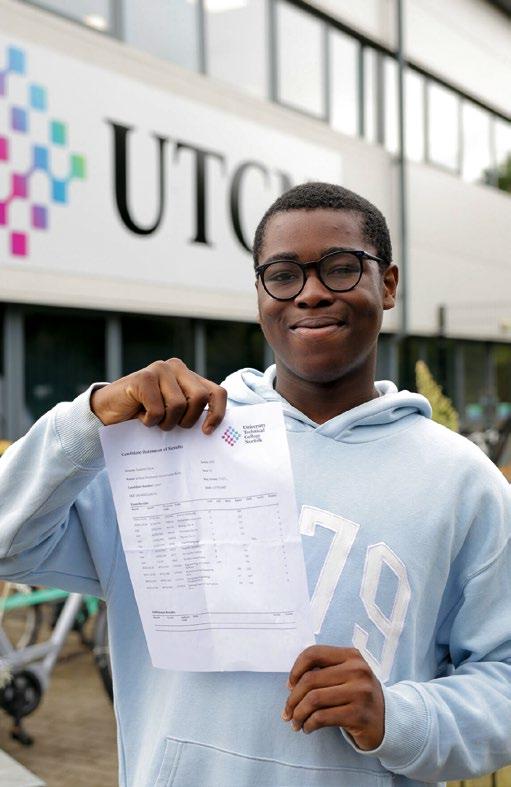
UTCN, Old Hall Road, Norwich, NR4 6FF Tel: 01603 580280 www.utcn.org.uk admissions@utcncst.org
University Technical College Norfolk is part of the Community School Trust (CST). CST is an established academy trust, passionate about the life chances of young people. We provide a first-rate education for every child and work hard to create outstanding schools that change perceptions and expectations across whole communities.
Find Your Future
